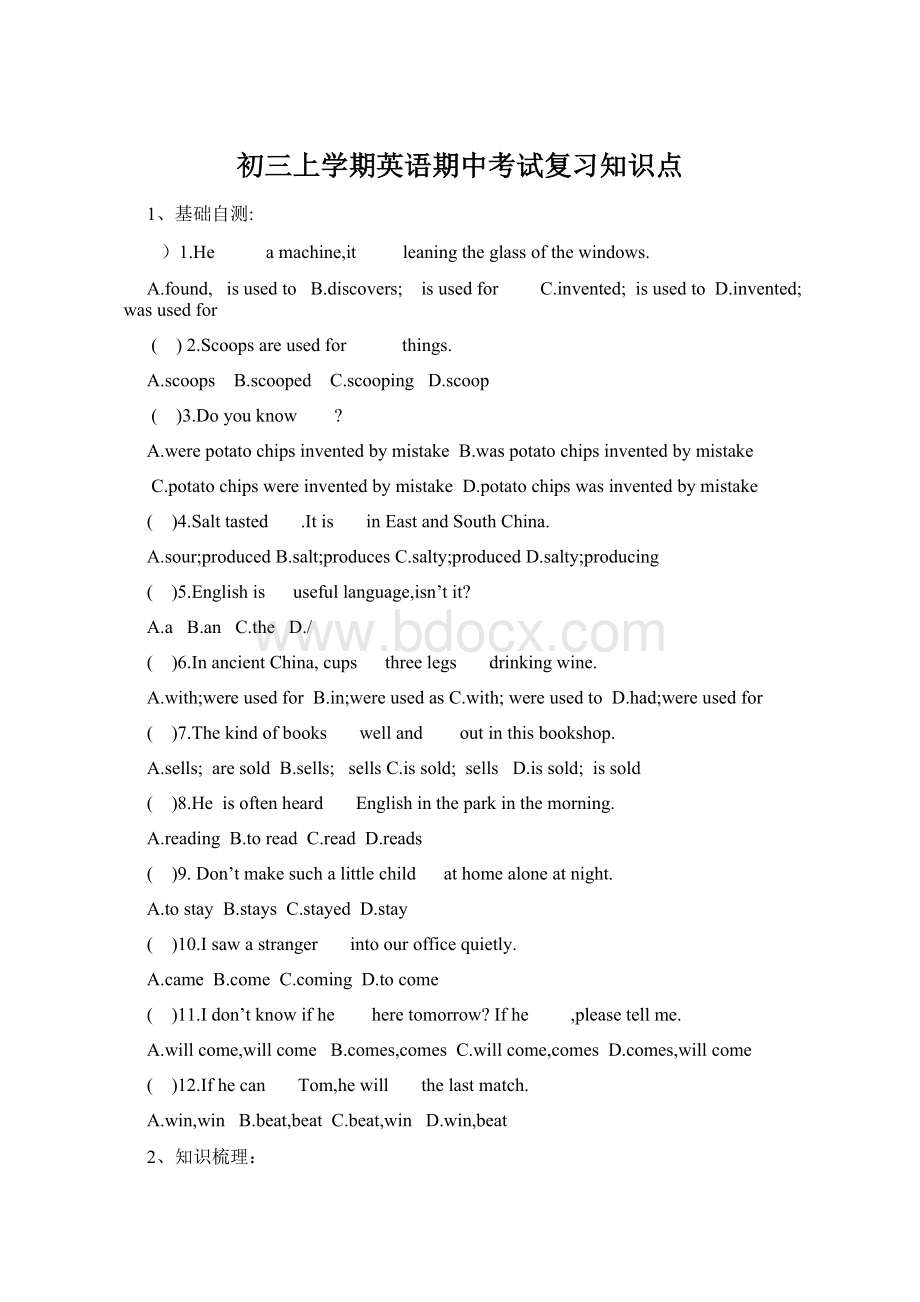初三上学期英语期中考试复习知识点.docx
《初三上学期英语期中考试复习知识点.docx》由会员分享,可在线阅读,更多相关《初三上学期英语期中考试复习知识点.docx(25页珍藏版)》请在冰豆网上搜索。

初三上学期英语期中考试复习知识点
1、基础自测:
)1.He a machine,it leaning the glass of the windows.
A.found, is used to B.discovers; is used for C.invented; is used to D.invented; was used for
( ) 2.Scoops are used for things.
A.scoops B.scooped C.scooping D.scoop
( )3.Do you know ?
A.were potato chips invented by mistake B.was potato chips invented by mistake
C.potato chips were invented by mistake D.potato chips was invented by mistake
( )4.Salt tasted .It is in East and South China.
A.sour;produced B.salt;produces C.salty;produced D.salty;producing
( )5.English is useful language,isn’t it?
A.a B.an C.the D./
( )6.In ancient China, cups three legs drinking wine.
A.with;were used for B.in;were used as C.with; were used to D.had;were used for
( )7.The kind of books well and out in this bookshop.
A.sells; are sold B.sells; sells C.is sold; sells D.is sold; is sold
( )8.He is often heard English in the park in the morning.
A.reading B.to read C.read D.reads
( )9. Don’t make such a little child at home alone at night.
A.to stay B.stays C.stayed D.stay
( )10.I saw a stranger into our office quietly.
A.came B.come C.coming D.to come
( )11.I don’t know if he here tomorrow?
If he ,please tell me.
A.will come,will come B.comes,comes C.will come,comes D.comes,will come
( )12.If he can Tom,he will the last match.
A.win,win B.beat,beat C.beat,win D.win,beat
2、知识梳理:
Unit1
一、知识点
1.Checkin:
在旅馆的登记入住。
Checkout:
在旅馆结账离开。
2.By:
①通过…..方式(途径)。
例:
IlearnEnglishbylisteningtotapes.
②在…..旁边。
例:
bythewindow/thedoor
③乘坐交通工具例:
bybus/car
④在……之前,到……为止。
例:
byOctober在10月前
⑤被例:
Englishisspokenbymanypeople.
3.how与what的区别:
how通常对方式或程度提问,意思有:
怎么样如何,通常用来做状语、表语。
what通常对动作的发出者或接受者提问,意思为什么,通常做宾语,主语。
1What…thinkof…?
How…like…?
2What…dowith…?
How…dealwith…?
3What…likeabout…?
How…like…?
4What’stheweatherliketoday?
How’stheweathertoday?
5Whattodo?
Howtodoit?
e.g.Whatdoyouthinkofthisbook?
=Howdoyoulikethisbook?
Idon’tknowwhatIshoulddowiththematter.=Idon’tknowhowIshoulddealwithit.
WhatdoyoulikeaboutChina?
=HowdoyoulikeChina?
Idon’tknowwhattodonextstep?
=Idon’tknowhowtodoitnextstep?
㊣Whatgood/badweatheritistoday!
(weather为不可数名词,其前不能加a)
㊣Whatafine/baddayitistoday!
(day为可数名词,其前要加a)
4.aloud,loud与loudly的用法:
三个词都与"大声"或"响亮"有关。
①aloud是副词,重点在出声能让人听见,但声音不一定很大,
常用在读书或说话上。
通常放在动词之后。
aloud没有比较级形式。
如:
Hereadthestoryaloudtohisson.他朗读那篇故事给他儿子听。
②loud可作形容词或副词。
用作副词时,常与speak,talk,laugh等动词连用,多用于比较级,须放在动词之后。
如:
Shetoldustospeakalittlelouder.她让我们说大声一点。
③loudly是副词,与loud同义,有时两者可替换使用,但往往
含有令人讨厌或打扰别人的意思,可位于动词之前或之后。
如:
Hedoesnottalkloudlyorlaughloudlyinpublic.他不当众大声谈笑。
5.voice指人的嗓音也指鸟鸣。
sound指人可以听到的各种声音。
noise指噪音、吵闹声
6.join加入某团体并成为其中一员attend出席参加会议或讲座
joinin与takepartin指参加到某项活动中去。
7.all、both、always以及every复合词与not连用构成部分否定。
其完全否定为:
all---none,both---neither,everything---nothing,everybody---nobody.
8.beafraidofdoingsth./sth.害怕beafraidofbeingalone
beafraidtodosth.害怕
beafraidthat恐怕担心,表示委婉语气
9.either:
①放在否定句末表示“也”
②两者中的“任一”
③either…or…或者…或者.…引导主语部分,谓语动词按照就近原则
10.a,an与序数词连用表示“又一”,“再一”。
例:
Pleasegivemeasecondapple.
11.havetrouble/difficult/problem(in)doing…..干…..遇到麻烦,困难
12.unless除非,如果不,等于“ifnot”本身就表示否定,引导条件状语从句,主句为将来时,条件状语从句用一般现在时表示将来。
例:
Mybabysisterdoesn’tcryunlessshe’shungry.
=Mybabysisterdoesn’tcryifsheisn’thungry.
Unlessyoutakemorecare,you’llhaveanaccident.
如果你不多加小心的话,你会出事的。
13.instead:
adv.代替,更换。
例:
Wehavenocoffee,wouldyouliketeainstead?
我们没有咖啡了,改喝茶好吗?
Itwilltakedaysbycar,solet’sflyinstead.
开车去要好几天呢,咱们还是坐飞机吧。
Tomwasill,soIwentinstead.汤姆病了,所以换了我去。
insteadofdoingsth.作为某人或某事物的替换
例:
Let’splaycardsinsteadofwatchingTV.
Wesometimeseatriceinsteadofpotatoes.
Givemetheredoneinsteadofthegreenone.
14.spoken口头的,口语的。
spokenEnglish口头英语
speaking讲话的,说某种语言的。
Speakingskills讲英语的能力
15.提建议的句子:
①What/howabout+doingsth.?
如:
What/Howaboutgoingshopping?
②Whydon’tyou+dosth.?
如:
Whydon’tyougoshopping?
③Whynot+dosth.?
如:
Whynotgoshopping?
④Let’s+dosth.如:
Let’sgoshopping
⑤Shallwe/I+dosth.?
如:
Shallwe/Igoshopping?
16.too…to太…而不能常用的句型too+adj./adv.+todosth.
如:
I’mtootiredtosayanything.我太累了,什么都不想说。
17.not…atall一点也不根本不如:
Ilikemilkverymuch.Idon’tlikecoffeeatall.
我非常喜欢牛奶。
我一点也不喜欢咖啡。
not经常可以和助动词结合在一起,atall则放在句尾
18.be/getexcitedaboutsth.===be/getexcitedaboutdoingsth.
===beexcitedtodosth.对…感兴奋如:
Iam/getexcitedaboutgoingtoBeijing.===
IamexcitedtogotoBeijing.我对去北京感到兴奋。
19.①endupdoingsth终止做某事,结束做某事